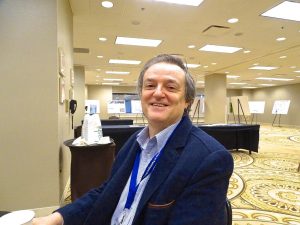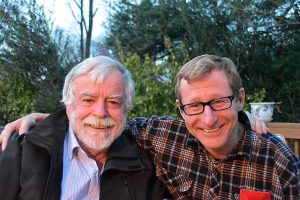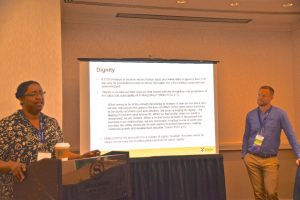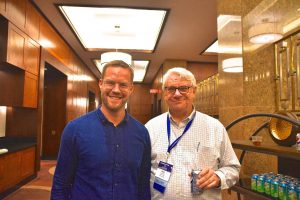Vedat Şar

Scientific Committee Chair, Vedat Sar, MD at ISSTD Annual Conference, 2018
ISSTD Scientific Committee has been active since 2012. Members of the Committee are selected for a three year term, which can be extended. One third of the Committee is replaced every year, enabling continuity. It is international and global in composition, and both clinicians and researchers are represented. Former presidents of ISSTD, Vedat Şar, MD (Turkey) and Warwick Middleton, MD (Australia) serve as Chair and Vice-Chair of the Committee. Current Committee members are Ruth Blizard (USA), Bethany Brand,PhD (USA), Paul F. Dell, PhD (USA), Martin J. Dorahy, PhD (New Zealand), Benedetto Farina, MD PhD (Italy), Heather Hall, MD (USA),Mary-Anne Kate, PhD (Australia), Milissa Kaufman, MD PhD (USA), Marilyn Korzekwa, MD (Canada), Christa Kruger, MD (South Africa), Andreas Laddis, MD (USA), Lauren A.M.Lebois, PhD (USA) Alfonso Martinez-Taboas, PhD (Puerto Rico), Dana Ross, MD (Canada), Adah Sachs, PhD (United Kingdom), Michael Salter, PhD (Australia), Adriano Schimmenti, PhD (Italy).

Scientific Committee Vice Chair, Warwick Middleton, MD with fellow committee member Martin Dorahy
In the seven years since its establishment, committee members have been able to publish several reviews and opinion papers on trauma and dissociation which are products of collaborative efforts. A current project is a collaboration between the ISSTD and ESTD Scientific Committees. Review articles are being prepared on six dissociation-related topics which are considered strategically important.

Committee Members Heather Hall, MD and Michael Salter, PhD presenting at ISSTD Annual Conference, 2019
The Committee discusses future possible activities which usually emerge through spontaneous proposals from its members. In this context, the Committee has decided to organize a two-hour face to face meeting during the 36th Annual Conference of ISSTD in San Francisco. The agenda of this meeting will cover identification of the research areas which are strategically important for the field; ways of expanding the representation of research output in the annual conference programs; potential projects of editorial books; and programs to reach out to emerging researchers and clinicians, among other topics which will emerge during preparations. Thus, proposals by ISSTD members about topics to be covered are also welcome.

Scientific Committee members Michael Salter and Paul Dell at the ISSTD Annual Conference, 2019
The experience of seven years in the Scientific Committee has led to the conclusion that Dissociative Identity Disorder, the prototype diagnostic category of our field, is no longer a subject of prejudice and stigmatization. What we need, now, is to continue to focus on how to serve our patients to the highest standard. The work of the field still only represents a tiny portion of all research production (approximately 3,600 published papers listed by Science Citation Index over 45 years). However, this field has immense potential. It is hoped that the work of the Scientific Committee will play a role in facilitating the study of dissociation to enable an expansion into many areas of mental health (clinical psychiatry, psychology, neurobiology, pharmacology etc) which would enable researchers and clinicians to influence the wider mental health field.





